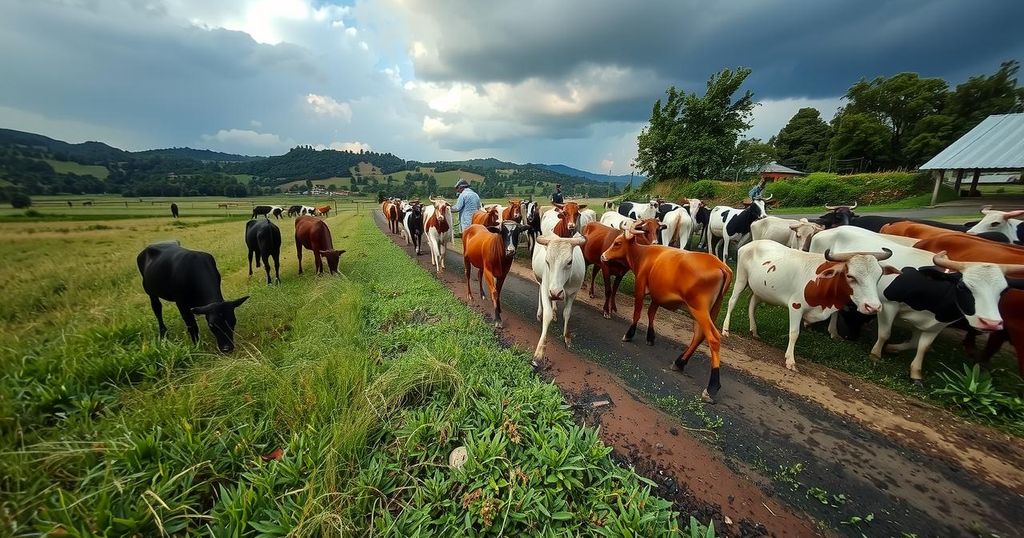Climate change is intensifying livestock diseases along the Kenya-Uganda border, leading to conflicts among pastoralists forced to move in search of grazing land due to drought. Despite historical peace efforts, new health threats are prompting calls for coordinated action and resource sharing to address these intertwined challenges and ensure community security and sustainable development.
Climate change has exacerbated livestock diseases, leading to increased tensions along the Kenya-Uganda border. Transboundary animal diseases, which are highly contagious and can spread rapidly across regions, pose serious economic and health challenges. The Turkana and Matheniko communities, who have historically enjoyed relative peace since the 1973 Lokiriama Accord, are currently facing severe water and pasture shortages due to prolonged drought. This scarcity is forcing pastoralists from areas like Loima and Turkana West to venture into the Karamoja region of Uganda, where conflicts frequently arise with armed bandits taking advantage of their vulnerability. Herders such as Mr. Korobe Ngasike have noted that despite efforts to combat banditry through coordinated security and peace initiatives, the imminent threat of deadly livestock diseases, worsened by climate change, now looms larger. For instance, Mr. Ngasike explained that the search for grazing lands leads pastoralists to higher disease burden areas, particularly susceptible to vector-borne illnesses like African animal trypanosomiasis and Peste des Petits Ruminants. Weather variability has also altered the pattern of outbreaks for these diseases, causing herders to reconsider their traditional strategies, previously focused on livestock raiding for restocking. During recent peace-building commemorations, community leaders agreed on the necessity of joint interventions to improve animal and human health in the border areas. Mr. Joseph Areng, a Peace Building Officer, highlighted the importance of coordinated livestock vaccination and treatment strategies to promote sustainable pastoralism and coexistence. Herders like Mr. Charles Ekai have raised concerns over the impact of tsetse fly infestations on their livestock, often resulting in death due to trypanosomiasis, while inadequate infrastructure hampers timely veterinary assistance. Additionally, Turkana Governor Jeremiah Lomorukai and Ugandan Minister Peter Lokeris underscored the importance of collaboration in tackling emerging border challenges, emphasizing that resource sharing agreements are vital for the socio-economic progress of the region. Governor Lomorukai stated that peace and unity are essential for effective coordination to address the needs of border residents, while Dr. Lokeris reiterated that sustained peace is critical for the region’s development.
The article highlights the complex interplay between climate change, livestock health, and cross-border relations between Kenya and Uganda. Transboundary animal diseases are not just local or national issues; their rapid transmission across borders necessitates collaborative approaches for management and prevention. The historical context provided by the Lokiriama Peace Accord illustrates how pastoral communities have navigated conflict but now face new challenges that threaten their livelihood and peace. The impacts of drought and resource scarcity compel herders to adapt their traditional ways, raising issues of security, nutrition, and health that are directly impacted by these complex environmental and socio-political dynamics.
In conclusion, the ongoing tensions along the Kenya-Uganda border due to climate change-induced livestock diseases necessitate urgent collaborative measures among pastoral communities and government authorities. Tackling the dual issues of disease management and resource scarcity through joint health initiatives and renewed agreements on resource sharing will be essential for restoring peace and ensuring sustainable livelihoods in the region. A united approach will not only safeguard the health of livestock but also foster a spirit of cooperation that can enhance socio-economic stability along the border.
Original Source: nation.africa






